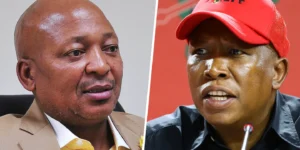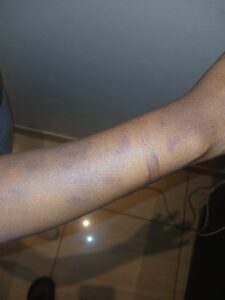By: Mzwabantu Zwide*
Let me jump in the fray on a robust raging debate sparked by Tourism Minister Lindiwe Sisulu’s article titled “Hi Manzi, have you seen justice”- published on the 6 Jan 2022 by various media outlets upon which many South Africans conversed from various platforms, notably social media and television.
The departure point of my opinion piece is only on the judiciary’s reaction and response to the article, with a specific focus on Deputy Chief Justice Raymond Zondo’s approach. However, the essence of my views resonates with popular assertions that the constitution remains an arguably a “living document” and therefore not immune from criticism by any South African.
Interestingly, the fanfare prompted by the opinion piece lasted over weeks, being dissected with a manifestation of ideas festival being echoed all over the space.
I have noted that several prominent South Africans rightfully offered their perspectives on the Minister’s column, with some vilifying her while others lauded the content of the entire article as stating “facts”.
Many South Africans, from ordinary to influential would recall that there had been many instances where patterns of vitriolic attacks and vilification were launched against the judiciary, without a single press briefing being convened in response. Evidently, the sustained attacks would have been on the rise under former President Zuma’s stewardship with a deafening silence on the part of the judiciary.
Zondo’s rebuke of the column as lacking any form of “substantiation” and “analysis” as if it’s a must that it must reflect these dimensions or else be rendered less objective or risk not being believed, smacks of utter arrogance and equally so, Zondo as a legal scholar failed to educate the country and the column author by giving a scholarly illustrated context between the terms “criticism” and “insults” in legal terms while pointedly indicating where Minister Sisulu had fallen short before generalising that her entire piece was fraught with “unwarranted insults” as claimed.
In my firm view, also held by others, Zondo’s conduct and actions left a lot to be desired as it had his personal emotions attached. Under the apartheid era, Zondo’s actions would have been pleasing to the oppressor and unleashed the heartless vultures in the form of notorious apartheid security police to devour Minister Sisulu alive.
If our non-obliterated history is anything to go by, it does provide unsavoury accounts of how some black judges under the atrocious system, colluded with the oppressors to convict and prosecute anti-apartheid activists for challenging apartheid laws.
The post apartheid epoch presented fresh societal challenges such as the old order relics which remain firmly embedded in some of our current legislations that our judges unashamedly continue to defend instead of championing a necessary legal discourse to repeal them. To attempt to censor the Minister in her expressions which were prompted by her own assessment and analysis of the journey this country undertook since its transition from the apartheid to the current dispensation, is reminiscent of the inhumane and torturous treatment our own people had endured under apartheid.
It is a desperate ploy to discredit, tarnish, impugn Minister Sisulu and ultimately polarise the necessary topical issue this country must debate about. The contentions held by Minister Sisulu on the judiciary arguably found expression on the conduct exhibited by Zondo during the JSC interviews for the position of the country’s Chief Justice at the apex court.
When asked whether he felt it was necessary and proper for him to convene a press briefing in response to the Minister’s column on the judiciary’s behalf as opposed to just issuing a “strongly worded statement or letter”, Zondo defended his actions and added that they were sanctioned by his colleagues from other divisions of the courts.
What a blunder! By doing so, Zondo played into the political gallery as the Minister raised the issues in a political context and sought to agitate a debate among conversing South Africans to add their voices on a matter of national interest as she also maintained. His unsolicited, power-mongering and attention-seeking response exhibited a sign of a judge who acted on a directive to reply to Minister Sisulu but disguised it as a collective view of colleagues whom I believe he must have mobilised to ratify his questionable stance.
If this was his was way of ingratiating himself with President Cyril Ramaphosa in order to be favoured for the appointment at the helm of the apex court, it proved perilous and miscalculated as it exposed his bias towards the President, a concern which was expressed during the interviews by the Commissioners.
Not only did his behaviour leave lingering questions over the independence, integrity and credibility of judges but also confirmed an existence of a somewhat “unethical” conduct among judges, especially when Zondo tried to deny having met Former President Zuma on two occasions in some hotel.
Zondo has been parading himself as a paragon of judicial integrity who is beyond reproach. During the State Capture Commission proceedings , he was seen in a viral video trying to coerce a witness to admit remembering something which he alleged he was not telling him.
Fast forward the 6 February 2022, the same Zondo couldn’t recall a single detail on what he discussed with former President Zuma at the said hotel despite being pleaded with to take the nation into his confidence.
A fair deduction from his uncooperative behaviour was that he was withholding information from the Commissioners and such provided sufficient grounds in casting doubts on his suitability for the position of a judge, let alone the Chief Justice.
In their course of not only safeguarding but interpreting the law, judges standing and demeanour, despite their natural fallibility ought to be beyond question so as to engender confidence and dispel negative narratives towards the judiciary.
I will not dwell into Judge President Mlambo’s accounts and his appointment recommendation by Minister Lamola to Zondo for an acting stint at the apex court. How materially defective this process was, was laid bare during the interviews with a concession obtained from Zondo that it was indeed inconsistent with the norm.
This gave credence to the notion that judges indeed collude with politicians in order to presumably predetermine outcomes of matters they preside over and this qualifies to be referred to as plain corruption.
The recent persistent opportunistic calls made by the so called lobby groups such as (Casac) and (Helen Suzman Foundation) that certain commissioners of the JSC be recalled from the structure, are merely driven by the anxiety that these individuals posed very unpopular and difficult questions to their preferred candidates which ultimately derailed their agenda with a potential to thwart their cases winning streak at court divisions led by these judges.
What is their interest on who must lead that arm of the state? Why it is necessary to revisit certain aspects of the constitution to achieve meaningful socio-economic change?
Something which needs to be borne into mind at all material times, is the fact that the constitution remains a product of negotiated settlement from the Codesa negotiations and it’s end product pleased others while it left others aggrieved.
Although the country had just emerged from an oppressive regime, it’s leaders were negotiating from a weak position in terms of power, giving the apartheid negotiators an ample opportunity to exploit and leverage on these weaknesses during the negotiations. Interestingly, the constitution makes certain commitments in the context of safeguarding and protecting certain rights and freedoms of citizens as explicitly enshrined in the Bill of Rights section. Needless to say that, the constitution has not fulfilled many of these commitments which continue to deteriorate the plight of the most vulnerable in society till today.
In addition, Minister Sisulu as a citizen of this country is expected to exercise her rights uncensored as affirmed by the constitution. Frowning upon and ganging up on her for doing what the constitution guarantees is tantamount to trampling on her very own rights and such constitutes an extensive injustice on its own.
Furthermore, taking an oath of allegiance to the constitution cannot mean surrendering your free speech right because of a ministerial job. The Minister’s assertions that the constitution is not a “Holy Scripture” is indeed manifested in the fact certain clauses are being revisited to realise certain post- apartheid democratic ideals.
A case in point here is section 25 of the Constitution which is currently under amendment as called upon by my sections of society including Minister Ronald Lamola while he was an ANCYL deputy President at a time. Lamola is on record as referring to the aforementioned section as a “problem” while addressing a well-attended ANCYL gathering and I was taken aback by his level of arrogance and cognitive dissonance when he criticised and bashed the Minister for saying the things he had also said before he became a Minister under Ramaphosa.
Well, his shocking attitude is synonymous with a typical pompous employee who landed a decent paying job which only existed as a distant dream in his head before it became an unexpected reality. It’s indeed an inconvenient truth to submit that our constitution only delivered a meagre 10% of the most crucial resource in land.
Ostensibly, all those who unwittingly ostracised the Minister Sisulu are hopefully mindful of the fact that this important resource is arguably the only means to bring about dignity restoration among our marginalised people, particularly blacks.
To this day, the country still grapples with the ravaging effects of widening inequality which reproduces nothing but continuing hardships, violence and misery among our people while huge portions of land are laying fallow. For an example, our government received complaints over the alleged misuse of the 3% land portions under the administration of traditional monarchs mostly located in rural areas and responded through the establishment of a panel which was led by the then President Kgalema Mothlanthe to probe.
This panel found adversely against the Ingonyama Trust on the saga and it’s recommendations that it be dissolved were met with resistance and threats of legal challenges even from the late King Goodwill Zwelithin himself.
Lastly, it’s a chilling fact known widely that the socio-economic transformation is far from being a reality in the real lived circumstances of our people and Minister Sisulu, being a Chairperson of the ANC’s social transformation committee is well-placed to have made such an assessment, with obviously divergent views and objections expected to arise from this.
Our government is lacklustre in advancing the social transformation project with all other stakeholders in the private sector included and for as long as this lethargic attitude remains evident, our people are bound to be mired in squalid conditions and wrecked by endless frustrations.
*Mzwabantu Zwide is a former Ministerial Rapid Response Task Team member of the former Ministry of Human Settlements, Water and Sanitation. He writes in his personal capacity







